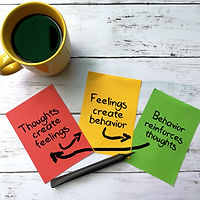Cognitive behavioural therapy, or CBT, is a talking therapy based on the theory that thoughts, feelings, what we do and how our body feels are all connected. If we change one of these, we can alt
Strengthening Foundations
Counselling offers a safe space to explore and work though emotional and behavioural challenges. You will be encouraged to talk about your feelings and experiences and given unconditional support. As you understand yourself better you will be supported to find solutions to problems and build the foundation for greater wellbeing in your life.
I use an integrative approach, which draws from a range of empirically supported counselling methodologies to tailor therapy to your specific needs. My training is primarily in cognitive behavioural therapies, but I am informed by the person centred approach, and also use the relationship that we build between us as a tool for healing. I also work with body based modalities, which can help you to feel grounded in your own experience, and strengthen mind body integration.
Ultimately my goal is to help you to better understand yourself, solve problems and find strategies for living the life that you want.
Topics that are often discussed in session include:
-
Depression
-
Anxiety and panic
-
Interpersonal relationships
-
Stress and anger management
-
Life transitions and change
-
Purpose and meaning
Sessions typically last 50 minutes and are available in person or through online video call.
Counselling


Cognitive Behaviour Therapy
Cognitive behavioural therapy, or CBT, is a talking therapy based on the theory that thoughts, feelings, what we do and how our body feels are all connected. If we change one of these, we can alter the others. When people feel worried or distressed, we often fall into patterns of thinking and responding which can worsen how we feel. CBT works to help us notice and change problematic thinking styles or behaviour patterns so we can feel better. There is good evidence to suggest CBT is helpful in treating: anxiety disorders. depression, chronic fatigue, chronic pain, sleep difficulties and anger.

Acceptance Commitment Therapy
ACT is a third-generation form of Cognitive Behavioural Therapy (CBT). It differs from traditional CBT as it does not focus on controlling thoughts, feelings, sensations, and memories but instead teaches to "just notice," accept, and embrace private events, especially previously unwanted ones. It’s a very mindful approach, that teaches practical strategies for getting in touch with oneself, clarifying personal values, observing and freeing oneself from limiting stories and self-concepts, and putting in place values led action. ACT can be helpful for anyone who is wanting to create meaning and purpose, but has been shown to be particularly effective in treating anxiety disorders, depression and addiction.

Solution Focused Brief Therapy
Solution-Focused Brief Therapy (SFBT) concentrates on finding solutions to current problems and challenges. It assumes that you know what you need to do to improve your own life and, with the appropriate coaching and questioning, you are capable of finding the best solutions. SFBT works well in dealing with discrete current challenges; you will explore what it is you want, and brainstorm ways of getting there. But it can be combined with other therapies, to work through challenges that emerge as the therapy progresses.

Mindfulness
Mindfulness is developable skill, which can support all kinds of therapy approaches. When we practice mindfulness, our thoughts tune into what we’re sensing in the present moment rather than rehashing the past or imagining the future. Through cultivating gentle curiously and acceptance of ‘what is’, we create a focused space for doing the work necessary now in this moment. Various tools are taught to help bring awareness to our thoughts, feelings, bodily sensations, and surrounding environment; including meditation, breathwork, physical grounding, attention skills etc.

Body Based Skills
When we have experienced difficulty, stress or trauma, it is not uncommon to feel confused or disoriented. Operating from a position of constant fight of flight, can leave us feeling uncomfortable in our bodies or our minds, ovewhelmed or 'shut down'. I am a certifed Becoming Safely Embodied Practioner (https://dfay.com) and teach body based skills to help calm the body, balance the nervous system and feel inwardly safe. Learning these skills makes it easier to make sense of what we experience inside, so that outside life feels more manageable.
